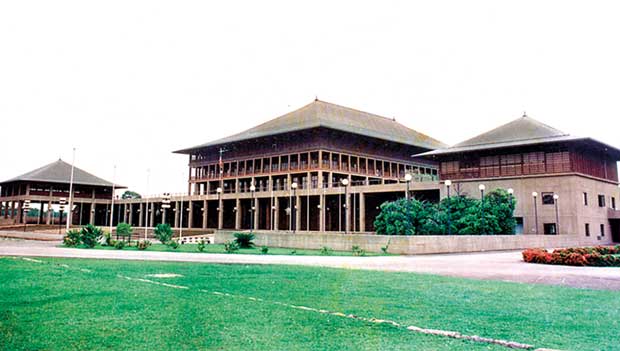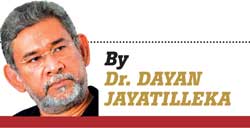Reply To:
Name - Reply Comment
Last Updated : 2024-04-20 00:00:00

“Turn the searchlight inwards.”
—The Buddha
“The main enemy is at home!”
—Karl Liebknecht
Who is the inspirer and driver of the new Constitution project? It certainly wasn’t the “foreign devil”--those wicked ole western imperialists. They’ve backed the project, but it wasn’t theirs. It was peddled to them by those sought to entrench their patronage.
In his Sept 2015 speech to the UNHRC while presenting the report of the OISL investigation into Sri Lanka, Zeid al Hussein makes no reference to a new Constitution. In his official statement at the end  of his Feb 2016 visit to Sri Lanka, the sole reference to anything of a Constitutional character was not to a new Constitution and was limited to the phrase “While there is much support for the very important proposed Constitutional reform…”
of his Feb 2016 visit to Sri Lanka, the sole reference to anything of a Constitutional character was not to a new Constitution and was limited to the phrase “While there is much support for the very important proposed Constitutional reform…”
In his March 2016 address to the UNHRC, Human Rights High Commissioner Zeid al Hussein’s only reference to the Sri Lanka’s Constitution was “There are important lessons in this respect for Sri Lanka…Important steps have been taken to reform the Constitution…”
The sole reference to a new Constitution by Zeid al Hussein is in his June 2016 statement to the UNHRC session: “In March, Parliament adopted a resolution establishing a constitutional assembly to develop a new constitution to go to referendum in 2017.”
This is repeated in his Oral Update to the Council in July 2016: “The process of constitutional reform had achieved significant momentum with the adoption of a resolution by the Parliament establishing a constitutional assembly to develop a new constitution to go to a referendum in 2017.”
Both references are observations he reports to the UNHRC on a Sri Lankan Government driven process rather than a recommendation by his Office or the 2015 UN Human Rights Council resolution.
Most crucially and conclusively, the UNHRC Resolution of 2015 with its poison arrows on accountability, which the Sri Lankan government was treacherous enough to co-sponsor, there isno reference whatsoever to a new Constitution! In fact, by contrast to its destabilizing and arrogant adventurism on accountability, it is quite moderate on political and constitutional matters—far more so than the Interim Report presented by the PM! There is a line in the Preamble (Pp20) of the 2015 UNHRC resolution which reads “Welcoming the Government of Sri Lanka’s commitments to the devolution of political authority”,and in the all-important Operative paragraphs, the only one pertaining to the Constitution (Op 6)refers to “constitutional measures” rather than a newConstitution, and its only specific stipulation refers to an article of the existing Constitution of Sri Lanka“in accordance with” which it encourages the government to take measures. The Operative paragraph reads as follows:
“Welcomes the government’s commitment to a political settlement by taking the necessary constitutional measures and encourages the Government of Sri Lanka’s efforts to fulfill its commitments on the devolution of political authority, which is integral to reconciliation and the full enjoyment of human rights by all members of its population; and encourages the Government of Sri Lanka to ensure that all Provincial Councils are able to operate effectively, in accordance with the 13th amendment to the Constitution of Sri Lanka.” This formula is carried over from the adversarial UNHRC resolutions of 2012, 2013 and 2014, and its relatively restrained nature, limited to the 13th amendment, is almost certainly attributable to the input of India which did not permit it to go dangerously further. The five hostile resolutions of 2012-2017 did not go beyond the 13th amendment, and did not recommend a new Constitution.
Interestingly the official US reference to a “new Constitution” dates back to a joint statement with Foreign Minister Mangala Samaraweera in Feb 2016 and extends support to something that the Sri Lankan government says it is doing: “The United States expressed support for the Government’s plans for constitutional and legislative reform including public consultations on a new Constitution…”
The next reference which is in similar vein, is in a statement issued in August 2017 by the US Embassy in Colombo when a two-person Congressional delegation met Prime Minister Wickremesinghe, Speaker Jayasuriya and TNA leaders Sampanthan and Sumanthiran: “They stressed in their official meetings the full support of the United States for the Government of Sri Lanka’s efforts to expedite a new Constitution…” None of this constitutes a smoking gun.
Significantly, US Assistant Secretary of State Alice Wells, in remarks on Sri Lanka in a far weightier written statement to the House Foreign Relations Committee in Sept 2017,makes no reference to a new Constitution, still less one that deletes the unitary definition and/or proposes federalism, saying “Specific steps include constitutional reform devolving more administrative power from the central government to Sri Lanka’s regions…” As the language of the 2015 UNHRC Resolution she refers to shows, the ‘constitutional reform devolving more administrative power from the central government to Sri Lanka’s regions’ pertains to the effective operationalizing of the 13th amendment to the Sri Lankan Constitution.
So we are looking in the wrong direction--outwards-- when far more conclusive evidence is available elsewhere. Whose idea was the new Constitution from the very beginning? The evidence shows that the mother of the new, non-unitary, covertly federalizingConstitution project is Chandrika Bandaranaike Kumaratunga. This was what two publications with a largely Tamil readership, the Uthayan and the respected Tamil Times (London) carried in 1994, quoting Wasantharajah, soon to be President Chandrika’s appointee as Chairman Rupavahini:
‘Chandrika replied as follows: “Yes, we are prepared for that. Tell them that. We will speak to them once we come to power. The present provincial council system is useless…The word ‘federal’ has been abused in the past. Therefore we will avoid that word and implement devolution in a meaningful manner. The country can be divided into five units of devolution, and wide powers can be granted to them. It will be possible to find a solution to the ethnic problem by bringing the North and the Tamil areas of the East under one unit and giving it the necessary powers”. ’ (Tamil Times, London, 15 July 1994, ‘Negotiating Peace in Sri Lanka’ ed. Dr. Kumar Rupesinghe, International Alert, London 1998, p 235)
The same toxic, corrosive stuff was in her ‘Package’ of 1995 and 1997 and is in the current Interim Report prepared primarily by Jayampathy Wickremaratne and presented by the PM. Riding on the back of a popular vote of over 60%, President Kumaratunga could not push through her new Constitution in 1995, 1997, 2000 or at any time during her first term, not to speak of her two terms in office. Yet her conspicuously stellar intellect (reinforced by the no less conspicuously stellar intellects of her crew) tell her that what she couldn’t do under such favourable circumstances, she can get done now. This is dangerously irrational adventurism. Why should the President and the SLFPrisk a nationwide referendum at which a protest vote could cause a landslide? The Government should prudently go for the low hanging fruit. The language of the UNHRC resolution reads: “…to ensure that all Provincial Councils are able to operate effectively, in accordance with the 13th amendment to the Constitution of Sri Lanka.” This would address the issue of “devolution of political authority”and comply with the only one of the UNHRC 2015 Resolution’s recommendations which can be implemented with no harm to the state, low political risk and minimal drama, because it does not exceed what President Rajapaksa promised when in office.
PresidentSirisena should chair an all-parties conclaveon the sidelines of the Constitutional Assembly and construct a broad consensus on “constitutional measures”which ensure that all Provincial Councils “operate effectively in accordance with” the existing 13A of the present Constitution. No less, no more.

Add comment
Comments will be edited (grammar, spelling and slang) and authorized at the discretion of Daily Mirror online. The website also has the right not to publish selected comments.
Reply To:
Name - Reply Comment
On March 26, a couple arriving from Thailand was arrested with 88 live animal
According to villagers from Naula-Moragolla out of 105 families 80 can afford
Is the situation in Sri Lanka so grim that locals harbour hope that they coul
A recent post on social media revealed that three purple-faced langurs near t